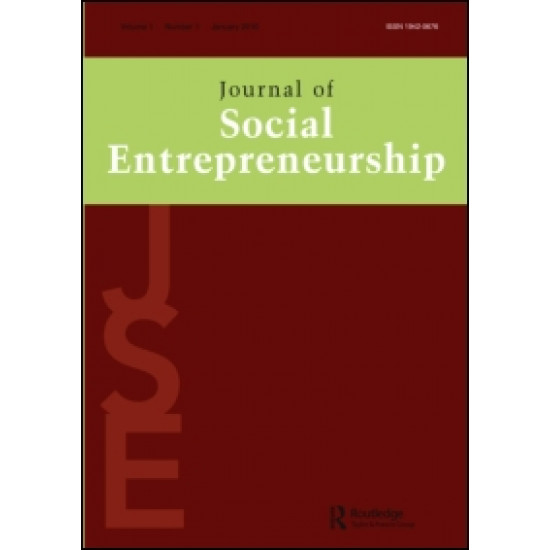
Journal of Social Entrepreneurship
To date, much of social entrepreneurship scholarship has emerged from business schools and has, as a consequence, tended to focus on organizational, strategic, and financial issues. The perspective has largely been to use business models to explore social innovation, and particularly, social enterprise (social entrepreneurship that moves towards self-funding). The approach has largely been 'what can social entrepreneurship learn from business perspectives'. This is an important part of the scholarly picture, but the Journal of Social Entrepreneurship has a far broader remit.
In this journal, social entrepreneurship is defined as having four key components - sociality, innovation, market orientation, and hybridity. First, sociality is a focus on a defined social purpose or benefit to society that is carefully measured. This could be identifiable by organization type such as co-operatives or charities, or sectors, like healthcare or education. Second, innovation is seen as either creative or destructive changes to social or economic systems. Third, market orientation places social entrepreneurship in a broader competitive landscape of funding, outputs, accountability and legitimacy, all focused on a relentless effort to improve performance and increase social impact. Finally, social entrepreneurship is defined by its tendency to operate in hybrid spaces between the public, private/commercial and civil society sectors - often in the form of hybrid organizational forms such as co-operatives or social enterprises. This definition of social entrepreneurship includes both for and not-for-profit organizations, as well as public sector bodies. However, it excludes all organizations the primary purpose of which is profit-maximisation, irrespective of whether they also aim to do social good, as this falls under quite the separate heading of Corporate Social Responsibility.
Key areas of interest for the Journal to draw from, and explore relationships with, include social policy and political science; anthropology; sociology; not-for-profit management; finance; organizational theory; strategy; social geography; (development) economics; ethics and moral philosophy; and social psychology. However, the Journal is open to work in any scholarly tradition with the twin caveats that the work is squarely focused on social entrepreneurship, and that it is high quality.
The vision for the Journal is as a high quality, multidisciplinary publication that embraces and encourages work on social entrepreneurship from a range of scholarly perspectives beyond business and management and accepts that social entrepreneurship has much to offer the third and public sectors. The Journal is unprescriptive with respect to methodology, accepting qualitative and quantitative work equally on merit. However, in order to build the academic credibility of social entrepreneurship, there is currently a need to move away from both descriptive case studies and individual 'hero' accounts of social entrepreneurs, so the Journal actively supports both theory-inflected work and broader empirical studies.
Peer Review Statement
Manuscripts submitted to the Journal are subject to editorial screening and double blind peer review.
₹29,232.90

















